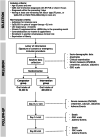COvid-19 and high-dose VITamin D supplementation TRIAL in high-risk older patients (COVIT-TRIAL): study protocol for a randomized controlled trial
- PMID: 33371905
- PMCID: PMC7768266
- DOI: 10.1186/s13063-020-04928-5
COvid-19 and high-dose VITamin D supplementation TRIAL in high-risk older patients (COVIT-TRIAL): study protocol for a randomized controlled trial
Abstract
Background: With the lack of effective therapy, chemoprevention, and vaccination against SARS-CoV-2, focusing on the immediate repurposing of existing drugs gives hope of curbing the COVID-19 pandemic. A recent unbiased genomics-guided tracing of the SARS-CoV-2 targets in human cells identified vitamin D among the three top-scoring molecules manifesting potential infection mitigation patterns. Growing pre-clinical and epidemiological observational data support this assumption. We hypothesized that vitamin D supplementation may improve the prognosis of COVID-19. The aim of this trial is to compare the effect of a single oral high dose of cholecalciferol versus a single oral standard dose on all-cause 14-day mortality rate in COVID-19 older adults at higher risk of worsening.
Methods: The COVIT-TRIAL study is an open-label, multicenter, randomized controlled superiority trial. Patients aged ≥ 65 years with COVID-19 (diagnosed within the preceding 3 days with RT-PCR and/or chest CT scan) and at least one worsening risk factor at the time of inclusion (i.e., age ≥ 75 years, or SpO2 ≤ 94% in room air, or PaO2/FiO2 ≤ 300 mmHg), having no contraindications to vitamin D supplementation, and having received no vitamin D supplementation > 800 IU/day during the preceding month are recruited. Participants are randomized either to high-dose cholecalciferol (two 200,000 IU drinking vials at once on the day of inclusion) or to standard-dose cholecalciferol (one 50,000 IU drinking vial on the day of inclusion). Two hundred sixty participants are recruited and followed up for 28 days. The primary outcome measure is all-cause mortality within 14 days of inclusion. Secondary outcomes are the score changes on the World Health Organization Ordinal Scale for Clinical Improvement (OSCI) scale for COVID-19, and the between-group comparison of safety. These outcomes are assessed at baseline, day 14, and day 28, together with the serum concentrations of 25(OH)D, creatinine, calcium, and albumin at baseline and day 7.
Discussion: COVIT-TRIAL is to our knowledge the first randomized controlled trial testing the effect of vitamin D supplementation on the prognosis of COVID-19 in high-risk older patients. High-dose vitamin D supplementation may be an effective, well-tolerated, and easily and immediately accessible treatment for COVID-19, the incidence of which increases dramatically and for which there are currently no scientifically validated treatments.
Trial registration: ClinicalTrials.gov NCT04344041 . Registered on 14 April 2020 TRIAL STATUS: Recruiting. Recruitment is expected to be completed in April 2021.
Keywords: Anti-inflammatory; Antiviral; COVID-19; Mortality; Older adults; Prognosis; Randomized controlled trial; SARS-CoV-2; Vitamin D.
Conflict of interest statement
CA occasionally serves as a consultant for Mylan Laboratories Inc (2020). All authors declare they do not have any other financial and personal conflicts of interest with this manuscript.
References
-
- Glinsky GV. Tripartite combination of candidate pandemic mitigation agents: vitamin D, quercetin, and estradiol manifest properties of medicinal agents for targeted mitigation of the COVID-19 pandemic defined by genomics-guided tracing of SARS-CoV-2 targets in human cells. Biomedicines. 2020;8:129. doi: 10.3390/biomedicines8050129. - DOI - PMC - PubMed
-
- Annweiler C, Legrand E, Souberbielle JC. Vitamin D in adults: update on testing and supplementation. Geriatr Psychol Neuropsychiatr Vieil. 2018;16:7–22. - PubMed
Publication types
MeSH terms
Substances
Associated data
Grants and funding
LinkOut - more resources
Full Text Sources
Medical
Miscellaneous


